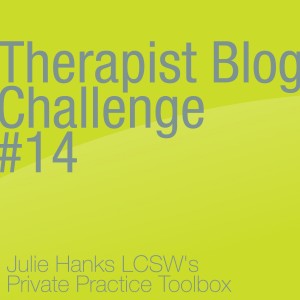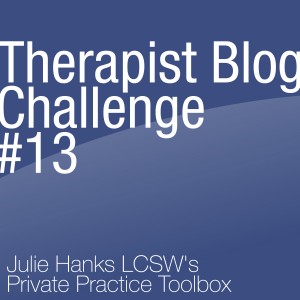 Therapist blog challenge #14 topic focuses on when to ask for and to consider feedback about a significant other.
Therapist blog challenge #14 topic focuses on when to ask for and to consider feedback about a significant other.
[Headline] Come up with a catchy title for your blog post. Here are a few examples:
Dating & the Peanut Gallery: What Other People Say About Your Love Life
Tough Critics: What they Really Think About Your Significant Other
To Ask or Not To Ask: Should You Talk to Your Friends About Your Romantic Partner?
[Strong Intro] Lay out the topic with a little more detail. Below is an example.
Should you ask your friends if they like your romantic partner? Should you listen to what they say? What are the pros and cons of getting feedback about your relationships?
Dating relationships can bring complex dynamics: Both parties have family and friends involved in their life who care about their well-being. But things can get tricky when that extends into romantic relationships. Here are things to consider when talking to other people about a romantic partner.
[Scanable Content]
Break your content into smaller, readable sections with a clear sub-heading. For this example, we'll lay out Do's and Don'ts when it comes to asking for and giving relationship feedback/ advice.
When should you ask for feedback?
Write about times when it might be appropriate for person in a relationship to ask for the opinions of other people. Maybe they want an outside perspective of how the relationships looks to others.
When should you not ask for feedback?
Write a short paragraph about when a person shouldn't ask for advice. This might include breaking the confidence of the romantic partner or discussing very personal, intimate details of the relationship.
When should you listen to feedback?
Now, write to a paragraph about when one should seriously consider loved one's feedback about a significant other. For example, if several loved ones share similar warning signs those should be taken into consideration. Or if "He/she is a great fit for you."
When should you not listen to feedback?
Write a paragraph about when a person should refrain from trusting loved one's feedback about their romantic partner. You could explore who's feedback you should not take into consideration, and what types of feedback you should dismiss. For example, it's never a good idea to listen to superficial concerns about someone's looks or chosen profession.
[Strong ending paragraph] The final paragraph wraps up your post and can include a summary of important points, additional resources, and a call to action, such as "Call today for a therapy consultation."
That's all folks. Get going.
Here are a few additional reminders about the blog challenge:
- Write and post your blog article in the next 2 weeks. If you miss the deadline or you read this article months later, that’s OK too.
- Post a link for this blog challenge in the comment section of this blog post.
- Read, comment, and share other therapist’s articles.
- Tweet your post using hashtag #therapistblog and tag @julie_hanks so I can retweet it.
- Pin it on the challenge Pinterest Board. I’ve invited everyone who posted a comment on the initial blog challenge post as collaborators so you can pin onto the group board.
- Spread the word and invite mental health colleagues to join the challenge. Articles can be added anytime throughout the year.
- Write no more than 600 words, make it easy to read, use a conversational tone, and gear your articles toward your ideal client (not other professionals).
- The goal of a professional blog is to provide value to your website visitors, help them get to know your professional perspective, increase traffic to your private practice website, and build your practice.
Here's a list of previous blog challenges. Jump in anytime!
Therapist Blog Challenge #13: Mental Health and Parenting
The therapist blog challenge is back! I'm making it easy to blog regularly as a practice building strategy.
Rather than start a new challenge, I've decided to pick up where we left off last year -- with challenge #13. If you are new to the challenge, you can start with challenge #1 or you can start with this current challenge. The goal of the challenge is to make it easier for you to blog regularly on your private practice website. Blogging can boost SEO, provide valuable information on your specialty areas, lets potential clients get to know you better, and establishes you as an expert. These factors can lead to more clients choosing your practice.
A good way to select a blog topic is to break down broad topics into smaller chunks. For example, mental health is an enormous subject, so focus and expand an aspect of it for one blog post. You can also turn this broad topic into a series of posts. For this example, we'll choose how mental health affects parenting.
[Headline] Here are three title suggestions that you may use or come up with a clear and catchy blog post title
4 Ways to Boost Your Mental Health and Improve Your Parenting
The Mental Health and Parenting Connection
Mind Your Mental Health: Your Children Will Thank You
[Strong intro] You can start with the paragraph below or customize it.
Like all other aspects of health, mental health can affect your parenting. For example, parents who suffer from Bipolar Disorder are 10 times more likely to overreact, which can lead to inappropriate punishments. Parents who are dealing with depression are often less responsive to their child's emotional cues. Here are some ways to mitigate the effect of mental health problems with regards to parenting:
[Scanable content] Make your content easy to quickly scan and find the main points.
1) Physical self-care
Write a paragraph about the importance of self-care for mental health treatment and prevention. You may want to include meditation, nutrition, rest, exercise. Emphasize the connection between physical health, mental health, and relationships. Self-care is critical prevention for parenting "meltdowns."
2) Remain calm
Write a paragraph about a skill parents can use to calm themselves when their child's behavior is difficult. You may want to share counting to 10, putting yourself in "time out", the importance of modeling emotional regulation skills for the child. When parents remain calm, children will become less emotionally reactive.
3) Treatment compliance
Write a paragraph about the importance of remaining in treatment and of following recommendations. This might include medication compliance, group therapy, family therapy, bibliotherapy, etc.
4) Playtime
Write a paragraph about the importance of play and recreation (re-creation) with their child, how play promotes positive attachment, and the mental health benefits of play for adults.
Add as many additional suggestions on how parents can take care of their mental health in ways that support successful parenting.
[Strong ending paragraph] Final paragraph can include a summary of important points, additional resources, and a call to action like "Make an appointment with Julie today!"
That's it! Read on for tips on sharing your blog article.
Additional reminders about the blog challenge:
- Write and post your blog article in the next 2 weeks. If you miss the deadline or you read this article months later, that’s OK too.
- Post a link for this blog challenge in the comment section of this blog post.
- Read, comment, and share other therapist’s articles.
- Tweet your post using hashtag #therapistblog and tag @julie_hanks so I can retweet it.
- Pin it on the challenge Pinterest Board. I’ve invited everyone who posted a comment on the initial blog challenge post as collaborators so you can pin onto the group board.
- Spread the word and invite mental health colleagues to join the challenge. Articles can be added anytime throughout the year.
- Write no more than 600 words, make it easy to read, use a conversational tone, and gear your articles toward your ideal client (not other professionals).
- The goal of a professional blog is to provide value to your website visitors, help them get to know your professional perspective, increase traffic to your private practice website, and build your practice.
5 Common Website Mistakes And How To Fix Them
 Your most powerful tool to build your private therapy practice in the digital age is an effective practice website. The Internet allows us to talk directly to potential clients who are seeking mental health information and services. The majority of Americans, 62 percent, use the Internet to find health care information (Pew Internet and Family Life Study, 2009).
Few therapists have training in website programing and design, but as technology evolves, more options become available to create a cheap or free website that looks professional and accurately represents your practice. My websites are built on Wordpress, a fairly easy platform on which to build a website or blog. There are thousands and thousands of free Wordpress themes that you can use to customize your practice website. Therapy Sites, another website resource for therapists, allows you to select a template and customize it for your practice based on a monthly fee.
Your most powerful tool to build your private therapy practice in the digital age is an effective practice website. The Internet allows us to talk directly to potential clients who are seeking mental health information and services. The majority of Americans, 62 percent, use the Internet to find health care information (Pew Internet and Family Life Study, 2009).
Few therapists have training in website programing and design, but as technology evolves, more options become available to create a cheap or free website that looks professional and accurately represents your practice. My websites are built on Wordpress, a fairly easy platform on which to build a website or blog. There are thousands and thousands of free Wordpress themes that you can use to customize your practice website. Therapy Sites, another website resource for therapists, allows you to select a template and customize it for your practice based on a monthly fee.
As I've consulted with therapists, developed my own websites, and done a lot of internet research, I've noticed some common mistakes that therapists frequently make when it comes to building websites. These are the top five mistakes I've seen and suggestions for how to fix the problem to make your website more effective.
Mistake #1: Contact information is difficult to find
How to fix it --> Put contact information on every page in a prominent place
Even if you are starting small with a single page site, your contact information is the most important information to feature. After all, you want clients to actually contact you to schedule a session, right? I suggest putting your contact information on every page of your website with a "call to action".
Mistake #2: Feels too Impersonal
How to fix it --> Write website text in first person and include a photo
When potential clients visit your site they should have a feel for who you are as a person. Always include a photo and a personal statement. While your bio can be written in third person, the rest of your site should feel like you're talking to your potential client.
Mistake #3: Too much "psychobabble"
How to fix it --> Focus on benefits of your service in layman's terms
Most potential clients aren't going to be familiar with psychological acronyms or detailed information about every credential and training. Your potential clients care less about your training and more about if and how you can help them. Write your website text with your ideal client in mind.
Mistake #4: Confusing site navigation
How to fix it --> Feature the the four topics above in your site navigation
Your website should be easy to navigate. You don't want your site to be an additional source of stress for potential clients. Visit other private practice therapist's websites and notice what you like and don't like, what works and what doesn't. Put yourself in the client's shoes. What information are potential clients looking for? Here are the top 4 things potential clients want to find on your website:
- who you are (your basic information)
- what you do (services)
- how you can help them (benefits of your services)
- how to contact you (contact information)
Mistake #5: Bad design
How to fix it --> pick one or two fonts and stick with a consistent theme throughout your site
Simple and clean is best when it comes to websites. Unfortunately, many therapists with "do-it-yourself" websites, in an attempt to be creative, end up using too many design elements. When designing your website, keep in mind who you're ideal client is, and let your basic message guide your choice of colors and fonts to create a cohesive feel that represents who you are as a therapist.
Are you guilty of making any of these mistakes on your private practice website? Post the link below and I'll give you feedback about your site.
 photo credit: twm1340
photo credit: twm1340
Does Google Love Your Therapy Practice?
 When is the last time you opened a phone book, looked in an actual encyclopedia, opened a dictionary, or navigated with an paper map? The Internet has revolutionized where we go for information. The several hundred million Google searches every day include searches by potential clients looking for your expertise, your niche, and your services. Can they find you?
Try Googling your name, or your therapy practice, or your specialty areas in your city. Where do you come up in the Google search? On the first page or on page number 25? If Google can't easily find you then neither can potential clients who are searching for you and your specific therapy services.
When is the last time you opened a phone book, looked in an actual encyclopedia, opened a dictionary, or navigated with an paper map? The Internet has revolutionized where we go for information. The several hundred million Google searches every day include searches by potential clients looking for your expertise, your niche, and your services. Can they find you?
Try Googling your name, or your therapy practice, or your specialty areas in your city. Where do you come up in the Google search? On the first page or on page number 25? If Google can't easily find you then neither can potential clients who are searching for you and your specific therapy services.
Take a look at these Internet facts:
- 62% of Americans use the Internet to find health care information. (Pew Internet and Family Life Study, 2009)
- 28-35% of Americans look online specifically for mental health information. (Pew Internet and Family Life Study, 2009)
- Kids aged 8-18 spend 7.5 to 10 hours a day “plugged in.” (2009 Kaiser Family Foundation Study)
For the past 5 years I've been actively leaving my digital footprint on the Internet for a two reasons: 1) To provide useful information to help women and families improve their mental health and family relationships and 2) To make it extremely easy for my ideal clients to find me and come to my private practice.
Keeping up with technology is crucial to building your private practice in a digital age. If you want to educate on mental health topics, promote grass roots social causes, and reach new clients (especially youth) with accurate mental health information and details about your services it's time to work harder to get Google's attention.
Here are a few things you can do to get Google to love your therapy practice and send new clients your way:
1) Get a website (if you don't already have one). Even if it's a one pager, it's better than nothing.
2) Include important keywords throughout the text of your website. Imagine what words that your ideal clients will be searching for.
3) Add a blog to your current website and write on topics that interest your ideal clients. Google favors new information so blog weekly.
4) Get others to link to your website. If you do media interviews, write articles, or network with other professionals always ask them to provide a link to your website. Add links to your website on any of social media profiles.
Google is the #1 referral source to my private practice. I love Google. I just searched my name "Julie Hanks LCSW" and Google found 26,100 results in about 0.16 seconds, and a search for my clinic "Wasatch Family Therapy" yielded 17,200 results in 0.18 seconds.
Over the next several months I'll be blogging on ways you can increase your visibility on search engines, ethically and effectively use social media so you can make it easy for your ideal clients to find your private practice...stay tuned.
 photo credit: The Daring Librarian
photo credit: The Daring Librarian


As healers, we genuinely like to do our work. Guiding clients through the therapy process and seeing them make progress is why we do what we do. But if you're in private practice, you know there's a lot going on in the back end and that it's crucial to run an efficient and organized business.